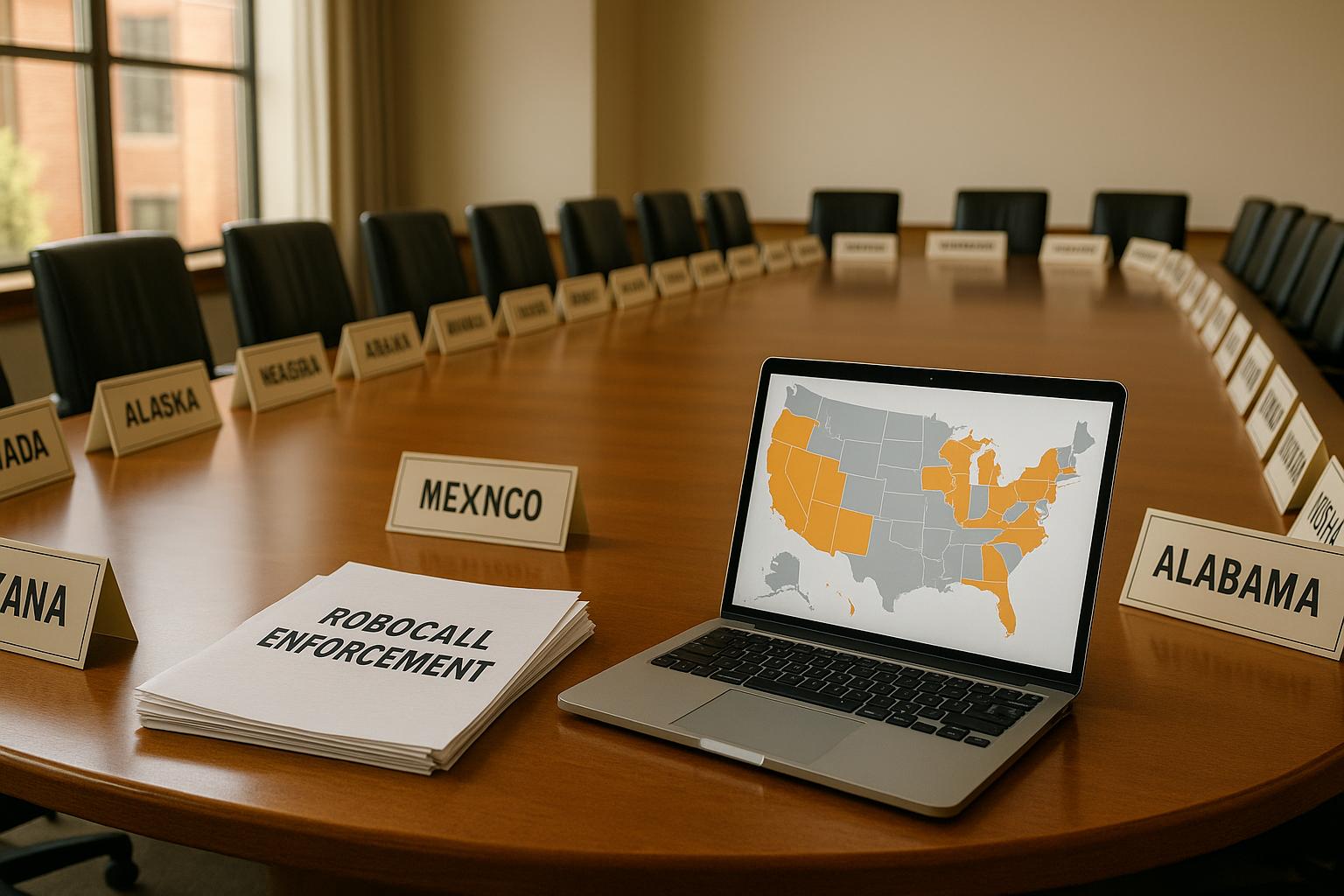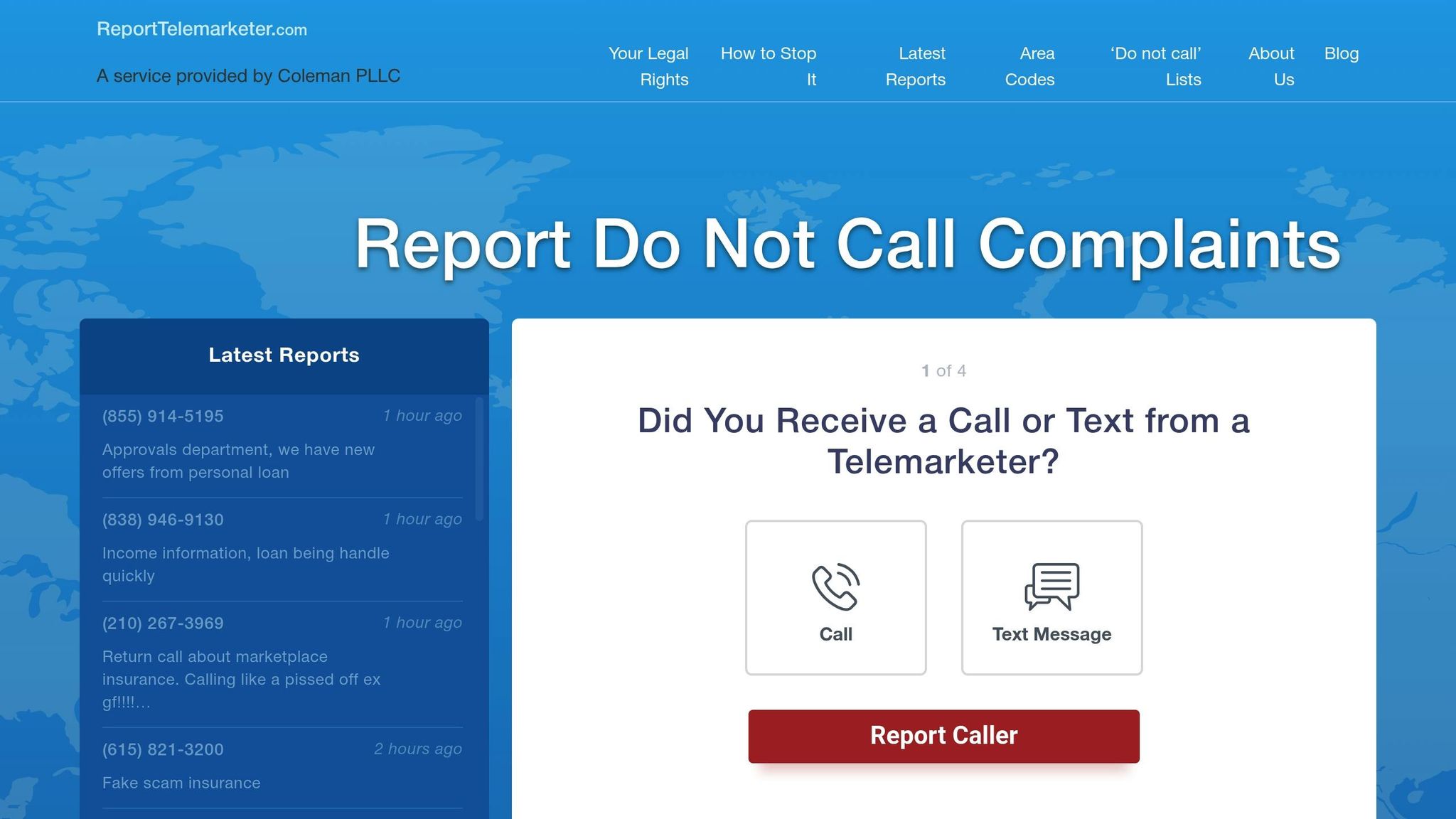
The 51-State Robocall Task Force is a nationwide coalition of attorneys general from all 50 U.S. states and Washington, D.C., created to combat illegal robocalls. Formed in 2022, the task force targets telecom providers that enable scam calls, focusing on enforcement, prevention, and consumer protection. Recently, in August 2025, it issued warnings to 37 voice service providers and over 99 downstream providers for failing to meet federal regulations.
Key Points:
- Purpose: Stop illegal robocalls and hold telecom providers accountable.
- Actions: Warning letters, penalties, cease-and-desist orders, and monitoring telecom networks.
- Consumer Impact: Reduced scam calls, better reporting tools, and stricter telecom standards.
- Collaboration: Bipartisan effort with state and federal agencies, telecom companies, and international partners.
Consumers can report robocalls through the FTC, FCC, or platforms like ReportTelemarketer.com, which offers free legal support to stop unwanted calls. By working together, the task force aims to reduce robocalls and protect consumers from scams.
Main Goals and Key Actions
What Are the Task Force’s Main Goals?
The 51-State Robocall Task Force is focused on three primary objectives:
- Investigating noncompliant telecom companies that fail to meet regulations, especially those contributing to widespread violations.
- Enforcing consumer protection laws through penalties, cease-and-desist orders, and legal actions to hold offenders accountable.
- Promoting proactive prevention measures by ensuring consistent enforcement across all jurisdictions.
By maintaining a unified approach across all 51 states, the task force sends a strong signal that noncompliance will have serious repercussions. This consistency also encourages telecom providers to take preventative measures before violations occur.
Major Operations and Programs
To meet its objectives, the task force has launched targeted operations aimed at curbing illegal robocalls. Key initiatives include issuing warning letters to noncompliant voice service providers and addressing both the underlying technology and the individuals responsible for violations.
This strategy represents a shift from relying primarily on consumer complaints. Instead, the task force actively monitors telecom networks to detect and address violations before they reach consumers.
Targeting Domestic and International Threats
The task force has expanded its focus to tackle both domestic and international challenges. Domestically, it penalizes noncompliant providers, while internationally, it holds domestic gateway providers accountable for enabling noncompliant VoIP calls.
These efforts are strengthened through collaboration with federal agencies and, when necessary, international partners. By sharing intelligence and coordinating enforcement actions, the task force aims to close regulatory loopholes and make it increasingly difficult for bad actors to exploit cross-border VoIP systems.
Effects on Consumers and Telecom Providers
How Does This Affect Consumers?
The task force’s efforts aim to cut down on unwanted calls, offering consumers a layer of protection they’ve been asking for. While it’s too early to gauge the full impact, these steps clearly prioritize safeguarding consumers. At the same time, they signal a move toward stricter oversight within the telecom industry.
New Requirements for Telecom Providers
Telecom providers now face stricter responsibilities under the task force’s updated approach. They are required to verify the authenticity of calls and keep a close watch on network traffic for any suspicious patterns. These actions are designed to strengthen defenses and make it harder for unauthorized robocalls to slip through.
State Cooperation and Legislative Changes
How Do States Work Together?
States collaborate by exchanging information on new scam tactics, methods, and technical tools to refine their enforcement strategies. For instance, if one state uncovers a new way to track robocalls or identify spoofed numbers, that knowledge is shared across the network. This collective effort allows other states to quickly adjust their strategies, creating a more unified and effective response to emerging threats. This kind of teamwork also lays the groundwork for legislative updates that enhance enforcement capabilities.
Recent State Law Changes
In response to these collaborative efforts, state lawmakers have strengthened consumer protection laws to address gaps that robocallers once exploited. New regulations now require explicit consumer consent for automated calls and introduce tougher penalties for violations. Some states have even gone a step further, giving consumers the right to take legal action against robocallers. These updates highlight a growing determination to protect consumers and hold offenders accountable.
Consistent Enforcement Across States
A standardized framework now ensures consistent enforcement protocols across state lines. This approach simplifies cross-border investigations and provides clear, uniform guidance to consumers. These cohesive measures underline the task force’s dedication to a coordinated, nationwide effort to combat robocalls effectively.
sbb-itb-a8d93e1
Consumer Resources and Reporting Options
How Can Consumers Report Robocalls?
While enforcement efforts ramp up, consumers play a crucial role in tackling robocalls by reporting them through official channels. The Federal Trade Commission (FTC) acts as a central hub for complaints via its Consumer Sentinel Network, which also supports state attorneys general by providing access to complaint data for coordinated enforcement efforts. Similarly, the Federal Communications Commission (FCC) has its own complaint system for robocalls and unwanted texts. Many states have integrated their reporting platforms with federal systems, enabling better tracking of robocall operations across state boundaries.
About ReportTelemarketer.com

ReportTelemarketer.com, a service provided by Coleman, PLLC, is dedicated to helping consumers stop unwanted telemarketing calls and texts. This platform has already assisted over 30,000 individuals in addressing these nuisances. When users report phone numbers through the platform, the service investigates those numbers using proprietary tools to uncover the telemarketer responsible. If violations are identified, ReportTelemarketer.com may issue cease and desist letters or even file formal complaints against the offending companies.
The service operates under the Telephone Consumer Protection Act (TCPA), which allows consumers to potentially claim $500 per violation.
"Telemarketers. You Report Them. We Stop Them."
Unlike government reporting systems, ReportTelemarketer.com takes the extra step of pursuing direct legal action on behalf of consumers. As the company puts it:
"We Stop the Calls For You."
Perhaps its most appealing feature is accessibility:
"Our Service Is Free."
Consumers pay nothing out of pocket, as attorney fees are recovered directly from telemarketers after the calls are stopped. Beyond legal action, the platform also provides educational resources to help consumers understand their rights and improve their call-blocking strategies.
Educational Resources for Consumers
Consumer education remains a top priority in the fight against robocalls. State attorneys general offer guides that cover topics like consumer rights, consent requirements, and recognizing scams. Tools such as call-blocking apps, carrier filters, and interactive resources help consumers differentiate between legitimate and illegal robocalls.
Webinars hosted by state attorneys general provide opportunities for real-time Q&A sessions, offering clarity on consumer rights. These educational efforts emphasize critical tips, such as avoiding the sharing of personal information during unsolicited calls and verifying caller identities through official channels.
Summary and Key Points
What Should Consumers Remember?
The 51-State Robocall Task Force, bringing together all 50 states and Washington, D.C., is taking a united stand against illegal robocalls. By focusing on both domestic and international operations, this bipartisan initiative strengthens enforcement across jurisdictions to tackle the issue head-on.
For consumers, this means enhanced protections, better ways to report unwanted calls, and stricter standards for telecom providers. Carriers are stepping up with improved call verification methods and tougher penalties for those who don’t comply. To help these efforts, it’s crucial for consumers to report robocalls through platforms like the FTC, FCC, or services such as ReportTelemarketer.com.
Understanding your rights and taking action by reporting these calls plays a key role in the fight against robocalls. Together, these measures aim to protect consumers and crack down on illegal robocall activities nationwide.
Attorneys general across country launch effort to crack down on robocalls
FAQs
How does the 51-State Robocall Task Force track and take action against telecom providers that violate robocall laws?
The 51-State Robocall Task Force keeps a close eye on telecom providers, tracking call patterns to spot those breaking robocall laws. When violations are suspected, the task force issues compliance demands, requiring providers to submit detailed plans – usually within 21 days – explaining how they’ll stop illegal robocalls.
If a provider ignores these demands or is caught transmitting large volumes of scam calls, the task force doesn’t hesitate to take legal action. This can include imposing penalties on companies that break FCC rules or enable millions of unlawful robocalls. By holding these providers accountable, the task force aims to curb harmful robocalls and safeguard consumers across the country.
What can I do to protect myself from illegal robocalls?
To shield yourself from illegal robocalls, there are a few straightforward steps you can take. Start by using call-blocking or labeling tools offered by your phone carrier or trusted third-party apps to filter out suspicious calls. It’s also wise to avoid picking up calls from unknown numbers, and under no circumstances should you share personal information with unsolicited callers. If you think the call might be a scam, simply hang up without engaging.
Additionally, you can report these calls to the FCC or FTC, which helps authorities track down and take action against illegal robocallers. Federal laws, such as the TRACED Act, are designed to tackle spoofing and enhance call authentication, giving you added security. Staying alert and taking proactive measures can make a big difference in cutting down on these unwanted interruptions.
How does working with international partners help the 51-state robocall task force fight robocalls more effectively?
Collaborating with international partners gives the 51-state robocall task force the ability to address robocalls right at their origin, especially those coming from outside the U.S. Through sharing information, coordinating investigations, and enforcing laws across borders, these partnerships make it easier to shut down illegal operations more effectively.
This joint effort has already achieved major breakthroughs, like a sharp decline in auto warranty scam calls. By pooling resources and expertise, the task force and its global allies are taking meaningful steps to shield consumers from the nuisance and harm of illegal robocalls.